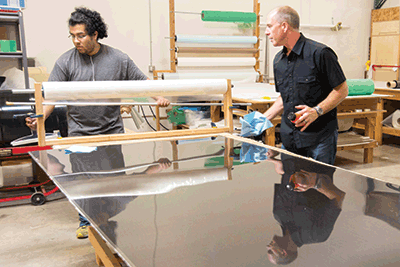What do clocks, cars, helicopters – and business cards – have in common? They can all be made of carbon fiber, an extremely strong but lightweight material in which local manufacturer ProTech Composites Inc. specializes. According to company president Jeff Olsen, carbon fiber is a material that is rapidly gaining popularity across multiple industries.
“We’ve just barely scratched the surface,” said Vice President Michelle Fennimore. “There’s a lot of opportunity. We have 16 to 18 business segments that we’ve outlined, and we could take any one of them and make it a business.”
Fennimore and Olsen bought ProTech Composites in 2010. At that time, the company was a couple years old, but was foundering due to poor management. Since then, they have turned the company around 180 degrees. Fennimore reported that the company’s total sales was up 32 percent 2010-2011, 28 percent 2011-2012, and a whopping 55 percent to date this year. Located in a 5,000-square-foot facility in Orchards, ProTech Composites has grown from a total of four employees to 17.
Olsen said that the company’s customer base is very diversified. Clients include large and small industrial and commercial companies as well as do-it-yourselfers and hobbyists. Additionally, he said, their customers are located around the world, including the United Kingdom, Australia and India.
The Vancouver-based company can supply everything from paper thin carbon fiber laminates to half-inch-thick carbon fiber panels. They can help with initial concept development, part production and custom machining.
Although stereotypically thought of as a material for airplanes and high-end autos, carbon fiber is quite versatile:
- Knife makers use it to produce lightweight but very strong handles.
- Interior designers create carbon fiber veneer panels for decorative applications.
- Auto, boat and spa manufacturers use it for gauge and control panels.
- The medical industry uses it in radiology because x-rays pass through it with no shadows.
- Silicon chip manufacturers use it for chip conveyance because its light weight means it uses less energy to move parts from place to place.
- Robotics companies, such as Vancouver-based Columbia Okura, take advantage of the fact that carbon fiber is lighter than aluminum but stronger than steel.
Olsen described a project where a California robotic company is using product from ProTech Composites to build a powered exoskeleton for humans. Applications include those with spinal injuries, firefighters and the military.
“It’s truly amazing the effect it has on people,” said Olsen. “We’re excited to be part of this technology.”
Fennimore said that ProTech Composites offers four finishes as well as colored and patterned product. Some products are unique in the industry. For example, the company can provide patterned carbon fiber sheets (other companies offer it only in fabric form). Other unusual offerings include a satin finish (which gives the same 3D look as high-gloss but is more scratch-resistant), double-sided gloss panels and a business card made of carbon fiber.
Olsen said that one factor in the company’s growing success is that they concentrate on customer service.
“It’s crucially important that [service] is the first priority. It’s been paying huge dividends with customers, vendors and employees,” said Olsen.
He said that the company tries to envision what the person who opens the box experiences, and give them more than what they ask for in terms of quality and value. In short, he said, the company wants to amaze them. Fennimore added that they “cultivate relationships with customers,” which leads to repeat business.
Another factor in the company’s growth is that they are concentrating on getting the right customer mix. In 2010, said Fennimore, the company’s web store was responsible for about 80 percent of the company’s business, and most purchases were small-volume. Today, the web store provides about 8 percent of sales, and the company has established a clientele of larger commercial/industrial accounts that buy larger volumes. However, Fennimore noted, ProTech is still happy to deal with individuals.
“We’re happy to take care of them and give them all the attention they desire,” said Fennimore.
With growth have come challenges. Olsen said that worldwide capacity for carbon fiber precursor material can fluctuate wildly. When Boeing and Airbus came out with their big plans, he said, the supply got very slim.
“Although supply has evened out, you don’t know what is going to be the next giant thing that will disrupt the market,” said Olsen.
Having geared up for a large project earlier this year by hiring new employees, Fennimore said keeping their workload constant is another challenge. The hurdle, she explained, is to keep the pipeline full enough so that when that project finishes, those employees will have additional work to do.
“We don’t want to go backwards,” said Fennimore.
After spending the last couple of years “setting the structure for the business,” Fennimore said ProTech Composite’s next big focus is sales and marketing.
“The market keeps coming up with more ways to use carbon fiber,” noted Olsen. “Our charge is to stay on top of all that and evolve with the industry with new systems and new products.”



